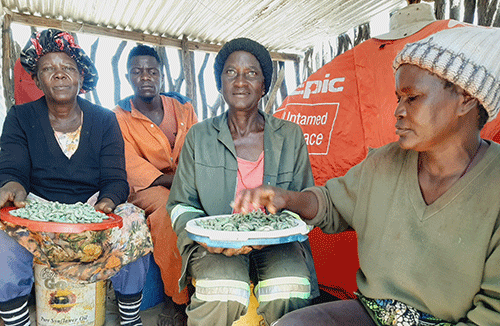ONGWEDIVA – Wild animals and deadly snakes pose a grave danger, but hundreds of people continue to flock to Amarika village in the Omusati region to harvest edible
worms. Amarika is located in the Otamanzi constituency, under the Ongandjera community forest.
The worms, known as okapuka or okatalashe, are mostly found on thorny shrubs during the rainy season. It is more common in the Omusati region, but remains a delicacy among many Aawambo communities of Namibia.
On an annual basis, this time of the year, hundreds if not thousands of people flock to and gather at Amarika to harvest the worms for free. Some go with tents, some put up shacks, while others commute from nearby villages. Harvesters collect them in large quantities and sell to people who want to resell, or for personal consumption.
As exciting as it is, this income-generating activity for mostly unemployed adults comes with grave danger and daily struggles.
“On Friday, we witnessed a lion attacking cattle not far from us. It killed and ate one cow. We had to run for our lives,” said Iitila Sem, who has been camping at Amarika for seven days.
Sem stressed that during the night, snakes also roam around their tents. And worse, the place has no network connection while there is no medical facility nearby.
“We are not safe here, but we have no choice… it is poverty that brought us here. It’s not easy to harvest worms,” he added.
Last year in the Uuvudhiya constituency, a woman reportedly died and her colleague survived after they were bitten by a venomous snake. They were sleeping in a shack at one of the worm collectors’ campsites.
Harvesters are likewise faced with the lack of water in the area, as they have to buy water for N$10 for every 20 litres. In fact, some people have moved their small tanks and containers to the harvesters’ site in order to sell water.
Nonetheless, Laimi Shigwedha from Otamanzi village finds it a joyful experience. She is happy as there are many worms this
season, unlike the previous one.
“I can even collect four 50kg per day. There are a lot of worms in the bushes,” she enthused. She and a group of other people walk a distance of up to 20km a day, collecting the worms. “You will not even notice that you have walked a long distance because all you do is bending your back, walk and collect,” she smiled.
Shigwedha said risks aside, she will make a better income this year.
“Nothing comes easily. We spend the whole day in the bushes collecting worms. My hands have developed wounds and blisters, and wounds from the thorns’ pricks and scratches. But that is fine, as long as we make a living,” she added.
-fhamalwa@nepc.com.na


